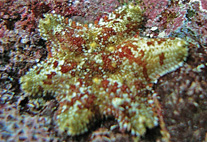Abstract
Stalacris n. gen. (Insecta, Grylloidea, Phalangopsidae) is described from South Africa using characters of morphology and male genitalia. This taxon, known from only two species, Stalacris meridionalis n. gen., n. sp. and Stalacris sp, is characterized by the unique structure of its forewings. These are prolonged distally as long, acute and more or less artic-ulated processes, forming a kind of forceps when forewings are opened.
References
Alexander, R.D. (1962) Evolutionary change in cricket acoustical communication. Evolution, 16, 443–467. http://dx.doi.org/10.2307/2406178
Alexander, R.D. & Otte, D. (1967) The evolution of mating behavior and mating in crickets (Gryllidae) and other Orthoptera. Museum of Zoology, University of Michigan, Miscellaneous Publications, 133, 1–62.
Brown, W.D. & Gwynne, D.T. (1997) Evolution of matings in crickets, katydids and wetas (Ensifera). In: Gangwere, S.K., Muralirangan, M.C., Muralirangan, M. (Eds), The bionomics of grasshoppers, katydids and their kin. C.A.B. International, Wallingford, UK., 281–314.
Chopard, L. (1938) La biologie des Orthoptères. Paul Lechevalier, Paris, 541p, 4 pls.
Desutter, L. (1987) Structure et évolution du complexe phallique des Gryllidea (Orthoptera) et classification des genres néotropicaux de Grylloidea.1ère partie. Annales de la Société entomologique de France (N.S.), 23, 213–239.
Desutter-Grandcolas, L. (1991) Les Phalangopsidae néotropicaux (Orthoptera: Gryllidae). I . Les Strogulomorphini. Annales de la Société entomologique de France (N.S.), 27, 465–481.
Desutter-Grandcolas, L. (1994 (1995)) Le genre Eidmanacris Chopard, 1956 (Orthoptera, Grylloidea, Phalangopsidae, Luzarinae) : habitat, répartition et espèces nouvelles. Bulletin du Muséum national d'Histoire naturelle, Paris, 16, 453–474.
Desutter-Grandcolas, L. (1995) Toward the knowledge of the evolutionary biology of phalangopsid crickets (Orthoptera, Grylloidea, Phalangopsidae: data, questions and scenarios. Journal of Orthoptera Research, 4, 163–175. http://dx.doi.org/10.2307/3503472
Desutter-Grandcolas, L. (1997) Studies in cave life evolution: a rationale for future theoretical developments using phylogenetic inference. Journal of zoological Systematics and evolutionary Research, 35, 23–31. http://dx.doi.org/10.1111/j.1439-0469.1997.tb00400.x
Desutter-Grandcolas, L. (1998) First analysis of a disturbance stridulation in crickets, Brachytrupes tropicus (Orthoptera: Grylloidea: Gryllidae). Journal of Insect Behavior, 11, 149–158. http://dx.doi.org/10.1023/A:1020878802954
Desutter-Grandcolas, L. (2003) Phylogeny and the evolution of acoustic communication in extant Ensifera (Insecta, Orthoptera). Zoologica Scripta, 32, 525–561. http://dx.doi.org/10.1046/j.1463-6409.2003.00142.x
Dambach, M.. & Lichtenstein, L. (1978) Zur Ethologie der afrikanischer Grille Phaeophilacris spectrum Saussure. Zeitschrift für Tierpsychologie, 46, 14–29. http://dx.doi.org/10.1111/j.1439-0310.1978.tb01435.x
Gorochov, A.V. (2003) New and little known crickets of the subfamily Phalangopsinae (Orthoptera, Gryllidae). 2. Oceania, Sri Lanka, and Australia. Entomological Review, 83, 719–729.
Heidelbach, J. & Dambach, M. (1991) Processing wing flick-generated air vortex signals in the African cave cricket Phaeophilacris spectrum. Naturwissenschaften, 78, 277–278. http://dx.doi.org/10.1007/BF01134358
Heidelbach, J. & Dambach, M. (1997) Wing-flick signals in the courtship of the african cave cricket, Phaeophilacris spectrum. Ethology, 103, 827–843. http://dx.doi.org/10.1111/j.1439-0310.1997.tb00124.x
Heinzel, H.-G. & Dambach, M. (1987) Travelling air vortex rings as potential communication signals in a cricket. Journal of comparative Physiology, A, 160, 79–88. http://dx.doi.org/10.1007/BF00613443
Mays, D.L. (1971) Mating behavior of Nemobiine crickets – Hygronemobius, Nemobius, and Pteronemobius (Orthoptera: Gryllidae). The Florida Entomologist, 54, 113–126. http://dx.doi.org/10.2307/3493557
Montealegre-Z., F., Jonsson, T. & Roberts, D. (2011) Sound radiation and wing mechanics in stridulating field crickets (Orthoptera: Gryllidae). Journal of experimental Biology, 214, 2105–2117. http://dx.doi.org/10.1242/jeb.056283
Otte, D. (1992) Evolution of cricket songs. Journal of Orthoptera Research, 1, 25–49. http://dx.doi.org/10.2307/3503559
Robillard, T. & Desutter-Grandcolas, L. (2004) Phylogeny and the modalities of acoustic diversification in extant extant Eneopterinae (Insecta, Orthoptera, Grylloidea, Eneopteridae). Cladistics, 20, 271–293. http://dx.doi.org/10.1111/j.1096-0031.2004.00025.x
Vahed, K. (1998) The function of nuptial feeding in insects: a review of empirical studies. Biological Review, 73, 43–78. http://dx.doi.org/10.1017/S0006323197005112
Walker, T.J. & Masaki, S. (1989) Natural history. In: Huber, F., Moore, T. E., Loher, W. (Eds),Cricket behavior and neurobiology. Cornell University Press, Ithaca and London, 1–42.
Zefa, E., de P. Martins, L. & Szinwelski, N. (2008) Complex mating behavior in Adelosgryllus rubricephalus (Orthoptera, Phalangopsidae, Grylloidea). Iheringia, Sér. Zool., Porto Alegre, 98, 325–328.

